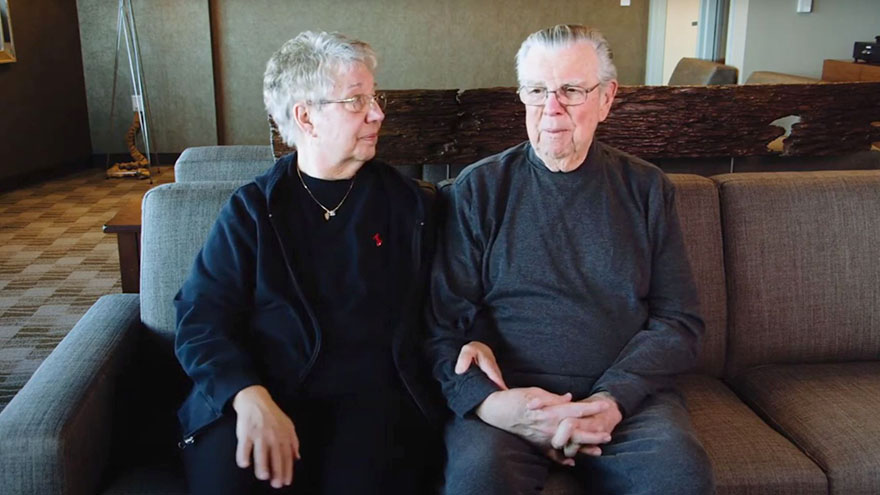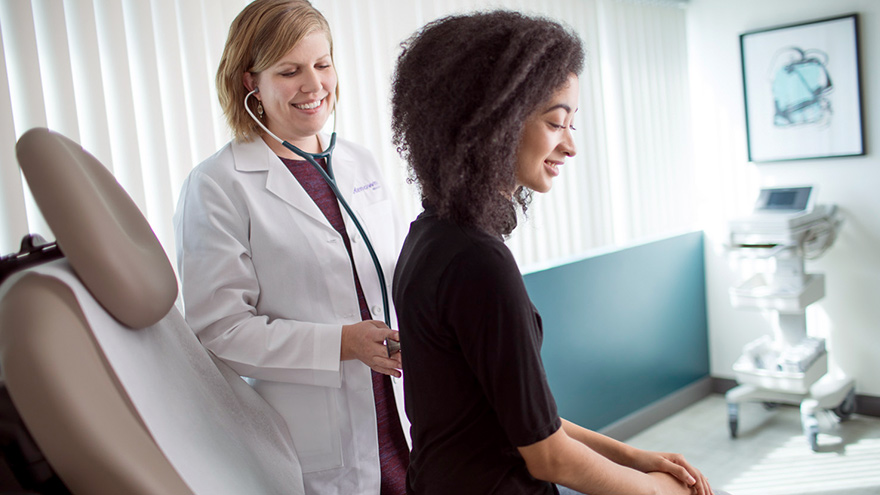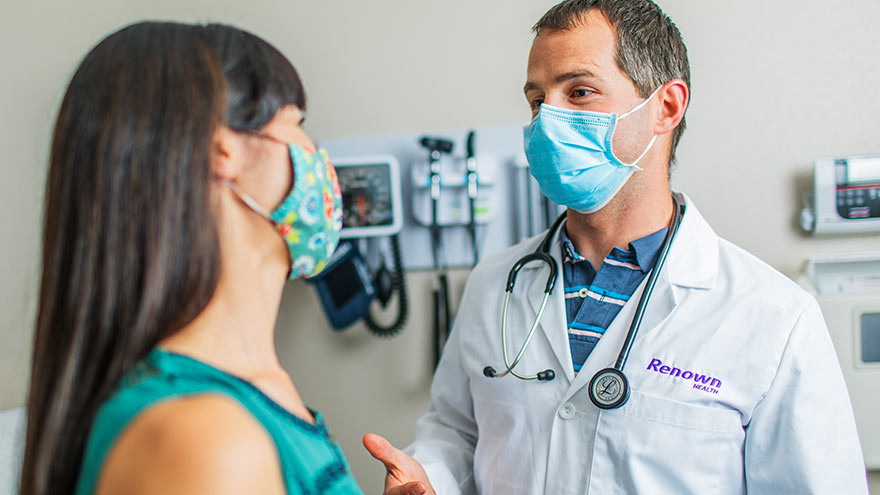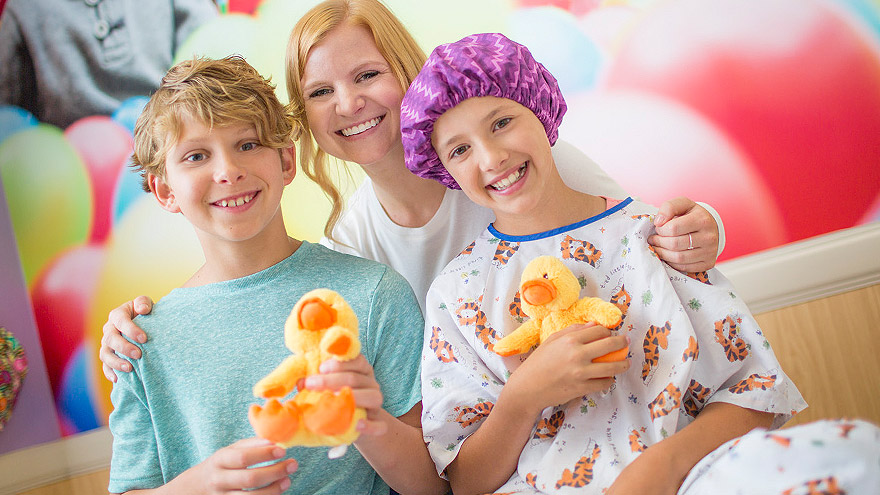Search
-
How Dorismae Reclaimed Her Life and Walking Shoes with TAVR
When lifelong trekker and adventurer Dorismae Weber learned her aortic valve was shutting down, she was afraid she was losing something she loved most: her daily walks. But following a trans catheter aortic valve implantation, Weber reclaimed her walking shoes — and her life. This is her story. An avid walker and traveler, Dorismae Weber’s life changed dramatically when she was exploring Mongolia and began having trouble breathing. Weber, 84, learned her aortic valve was shutting down. “It’s scary when you lose what you’ve always done,” Weber says. “I’ve walked all my life, and it’s always been the place I’ve gone to for comfort, for solving problems, for just enjoying. But all of a sudden, I couldn’t do this anymore.” Weber was not a candidate for traditional open heart surgery because she had heart surgery in the past. Then Weber learned about about trans catheter aortic valve implantation, also known as TAVR. She went to see Renown cardiologist Jake Ichino, MD, who put her through a battery of tests before performing the procedure. “Unlike the standard traditional open heart surgery, TAVR is a less invasive approach,” Dr. Ichino says. “We traditionally go up the artery of the leg with a catheter tube device and then we implant a valve without opening the chest.” After the TAVR procedure, Weber was once again able to complete her daily five-mile hikes. “When I woke up, all I can tell you is that I looked around and I thought, ‘I have a whole new life ahead of me — when I was told there was very little left,'” Weber says. She has also planned a trek just below the arctic circle with the environmental group Earthwatch. “I’m here because I had that procedure,” Weber says. “I’m here because they offered that procedure. And I’m very grateful for it, because I wouldn’t be here without it.” To learn more about TAVR, visit Renown’s Institute for Heart and Vascular Health.
Read More About How Dorismae Reclaimed Her Life and Walking Shoes with TAVR
-
Carl and Janis Team Approach to Renowns Healthy Heart Program
Meet a couple that's all heart. After each had a heart attack one year apart, they committed to Renown's new Healthy Heart Program and support each other along the road to heart health. Almost a year to the day that Janis VanHorn had a heart attack, her partner, Carl Edson, had one too. "That kind of doubled the dose of making sure that we were doing everything that we could to continue with our life," VanHorn says. "It's a very life-altering thing.” And after Edson's quadruple bypass open heart surgery, he was grateful for the simple act of getting into the car with the woman he loves. "I was so relieved," he says. "I didn't realize how precious life was until that moment." The couple see the same cardiologist, Richard Seher, M.D., FACC, FSCAI, who recommended they participate in Renown's new Healthy Heart Program, a 12-week, 36-visit intensive cardiac rehabilitation curriculum that includes monitored exercising and cooking classes. Now they're both familiar faces at the program, which is located at the Renown South Meadows Medical Center. After several weeks, Edson says he has lost 10 pounds and VanHorton has lost inches and feels more toned. Tackling the program together has brought the couple closer and given them the opportunity to fuel one another's health goals and longevity. "I would be lost without this man," VanHorn says," and anything I can do to help him live longer, I'm going to do that." Edson adds, "She is to me my whole life, and I mean that sincerely. There's no one else I can turn to that has helped me in my life as she has, and I'm just trying to return the favor in a big-time way. She is my everything."
Read More About Carl and Janis Team Approach to Renowns Healthy Heart Program
-
Paleo Garlic Mashed No-Tatoes
This scrumptious mashed potato substitute is super easy, tasty and gluten-free.
-
True Grit Healing a Cowboys Heart
At 85, James Domingos is still enjoying life as a cowboy, thanks to a transcatheter aortic valve replacement. Always rolling with the punches when it comes to life, 85-year-old James Domingos faced his health issues with the same grit. For many years, he roped cattle for friends and rounded up horses for the Bureau of Land Management. In recent years, a pacemaker controlled the rhythm of his heart, but didn’t slow him down. “We used to be able to take walks for 15 minutes in one direction and take the dog,” says Domingos’ wife, Joy. “Then it got to be less and less.” Tests at Renown Health revealed a heart valve was nearly closed. His heart doctor, Jake Ichino, MD, FACC, FSCAI, suggested a transcatheter aortic valve replacement, known as TAVR, which repairs a heart valve without removing the damaged valve. The procedure is recommended for patients who are at high risk for open heart surgery.
-
Book Ahead to Make Urgent Care More Convenient
How do you take the waiting game out of your Urgent Care visit? Book ahead! Here’s how this convenient service can help you schedule your appointment and see updated wait times at area urgent care facilities. We’ve all been there, done that: It’s after hours, you need to see a doc, and urgent care is slammed. Renown now offers a convenient option that will enhance your experience. Here’s How Book Ahead Works: From your phone or computer, you can check urgent care wait times around our region. This lets you see if the urgent care by your office is busier than the one closest to home — which may help your planning. Through Book Ahead, you can join the line at a specific urgent care just as you would in person. This allows you to stay home or at work as long as possible so you are more comfortable. Book Ahead When and Where to Receive Care We have many choices when it comes to our medical care. Should you visit a doctor’s office, urgent care, emergency care or make a Virtual Visit? It’s important to know which choice is right for your situation or condition. We asked Luis Palacio, M.D., with Renown Urgent Care to explain the differences and how to make your visit as smooth as possible. If you have been experiencing flu-like symptoms for less than 48 hours, call your doctor’s office. They can then determine if you can be treated with a prescription antiviral medicine. Visit urgent care or the emergency room only if you are unable to eat or drink anything and may be dehydrated, have a fever over 102.5 degrees F, or are experiencing shortness of breath. You can use Renown’s Virtual Visits videoconference service for flu-like symptoms so that you don’t need to leave the comfort of your home and you reduce the risk of spreading the virus to others. Virtual Visits allow you to see an urgent care provider from your home or office using a cellphone, computer or tablet with video capabilities. It is open from 8 a.m. to 6 p.m. Monday through Friday, and 9 a.m. to 4 p.m. Saturday and Sunday. How Do You Book Virtual Visits? Go to Virtual Visits to get started. Here, you’ll learn what virtual check-in is all about: It allows you to stay where you are and receive text notifications once a care provider is almost ready to see you. Click, join a line, and we will ask you some questions about your symptoms. This allows us to make sure you don’t need to call 911 or go to the ER. Reasons to visit the ER include stroke, chest pain, severe shortness of breath, uncontrolled bleeding, seizures and severe allergic reaction. If you answer “no,” you will see the wait times for each urgent care location. If you need to get in right away, you can select the location with the shortest wait time. Or, if time is not an issue and you’d prefer to stay closer to your home or office, you can select that location. Once you’ve selected a location, you input your cell number, name and number of patients. As your appointment gets closer, urgent care will text you with updates on timing. When you get the text message, you can choose to get “more time” and have your appointment pushed back, or tell them you’re ready to be seen and on your way. Learn more about how to Book Ahead at Renown urgent care below.
Read More About Book Ahead to Make Urgent Care More Convenient
-
What is Disordered Drinking?
An alcohol problem can affect anyone at any age. Many factors, including job stress, genetics or depression, may contribute to the start of disordered drinking. Drinking alcohol exists on a continuum. For example, if someone feels down in the dumps for some time, it doesn’t mean they are clinically depressed. So if someone goes through a period with above-normal alcohol consumption, it doesn’t necessarily mean they abuse alcohol. Although “alcoholic” and “alcoholism” are common, they are not clinical descriptions. Alcohol use disorder is the preferred term. Symptoms are often mild but can be the start of a more significant problem. According to the National Institutes of Health (NIH), over 16 million adults live with alcohol use disorder. Symptoms of Alcohol Use Disorder Do you recognize any of the following symptoms in yourself or someone you know? Drinking more or longer than intended Trying to cut down or stop drinking but not able to Having to drink more than you once did to get the same feeling Being annoyed when family members discuss your drinking Regretting your behavior while you were drinking
-
8 Reasons to See a Cardiologist
While February is recognized as American Heart Month, it’s important to prioritize your heart health 365 days a year. Cardiologists play an integral role in our overall health and wellbeing – they are the experts when it comes to preventing and treating heart and vascular diseases. Dr. Jad Al Danaf of Renown Institute for Heart & Vascular Health shares eight reasons to visit a cardiologist. 1. Abnormal EKG The American Heart Association states an electrocardiogram, abbreviated as EKG or ECG, is a recording of the heart’s electrical activity to measure the rate and rhythm of the contractions in the upper and lower chambers of the heart. An EKG detects heart problems or abnormalities. If you have an EKG that shows abnormal results, you’ll want to see a cardiologist. An abnormal EKG can mean many things, such as irregular heart rate, heart rhythm abnormalities in the shape or size of the heart, medication side effects, and more. A cardiologist is most qualified to evaluate an abnormal EKG and determine the cause. 2. Immediate family history of heart disease or sudden cardiac death Knowing your family health history is essential to identify if you’re at risk for certain health conditions such as heart disease. For example, if you’re aware of anyone in your immediate family who had or has had heart problems or passed away from sudden cardiac death. In that case, you’ll want to discuss it with a cardiologist so they can determine if screenings, medications, or lifestyle changes are needed to help lower your risk. 3. Chest pain or shortness of breath with exertion If you have chest pain or shortness of breath that starts or worsens with activity, it may indicate a heart problem, and you should schedule a visit with a cardiologist immediately. Severe chest pain might be a sign of a heart attack or other serious medical emergency. If you’re experiencing severe chest pain, shortness of breath, or any other signs of a heart attack, call 911 immediately. 4. High blood pressure Have you had a high blood pressure reading? If so, it’s recommended to consult with a cardiologist for further evaluation. High blood pressure puts you at risk for heart disease and stroke, as uncontrolled high blood pressure can damage arteries, reducing blood flow and oxygen to your heart and brain.
-
3 Ways to Switch to a Medicaid Plan Accepted at Renown
Medicaid plays a significant role in our health care system and is the nation’s public health insurance program. In addition, this program is the predominant source of long-term care coverage for Americans. Renown Health is contracted with two Medicaid plans: Molina and Anthem. If you currently have a different plan but want to change to one that Renown accepts, you can request to change plans during the open enrollment period from January 1 to March 31. Request to change your Medicaid plan in one of three ways: Request a change to your plan, or managed care organization (MCO), by reviewing the available MCO plans online at bit.ly/MCOPlansNV and filling out the form on the webpage. Email Nevada Medicaid to ask for a plan change and include your name, Medicaid ID and the names and Medicaid IDs of any dependents in your home: MCORedistribution@dhcfp.nv.gov. Call your local Medicaid district office at 775-687-1900 (northern Nevada) or 702-668-4200 (southern Nevada) to ask about changing your plan. For more information about the Medicaid plans accepted at Renown Health, please visit: Anthem Molina Healthcare Renown Health accepts most insurances, but please visit the link below for the full list. Click here for all accepted plans
Read More About 3 Ways to Switch to a Medicaid Plan Accepted at Renown
-
Getting to Know Renown's Canine Companions
A slobbery kiss, a wagging tail, a judgement-free smile. There are few things better than the love and attention of a canine companion. At Renown Health, we have a loyal and playful group of pet therapy teams. This volunteer program uses animal-assisted interactions (AAI) and animal-assisted therapy (AAT) to provide comfort, reduce boredom, increase social interactions, improve mood, boost general well-being and – perhaps most importantly – bring smiles to our patients’ faces. Benefits of AAT & AAI: Lowers blood pressure and heart rate by relieving anxiety Helps in pain management Eases feelings of depression, loneliness, boredom and isolation Stimulates communication Encourages physical activity For more information about the program, a complete list of our teams or to get involved, click here. Meet Keno and Linda Linda, Keno’s human, has volunteered as one-half of a therapy dog team for more than 14 years. Keno is her third Newfoundland, and he is a sweet and cuddly 2-year-old pup, who, according to Linds, thinks is a lap dog. “My mother was in assisted living for almost 10 years, and I saw what an impact a therapy dog can have,” Linda said. When she moved to Reno from Portland six years ago, she immediately contacted Renown. A Memory the Stands Out: A patient in the ICU was not responsive because of oxygen deprivation due to almost drowning. Linda and Keno went into the patient’s room at his physical therapist’s request, and the therapist asked the patient to reach out and pet the dog. After the third request, he moved his hand toward the dog, and his mother burst into tears. It was the first time the patient had moved since his accident. Linda and Keno went back several days in a row, and soon the patient was talking, sitting up and eating on his own. Meet Madi and Clark Madi, Clark’s human, is an employee at Renown, and Clark made it a family affair by joining the team in Sept. 2021. Clark is a unique pup with an amazing demeanor who adores everyone as much as they adore him. He is a hardworking Goldendoodle who loves to be a goofball at home when he’s off the clock. Why They Became a Therapy Dog Team: Madi was inspired to get Clark trained as a therapy dog because, as an employee at Renown, she was always so happy to see dogs walking around, and she knew that I wanted to provide that same relief to others. Her favorite thing about being a Renown volunteer is the joy it spreads to those working and the patients they are caring for. Meet Richard and Raven Raven is a four old Belgian Malinois who has been working as a therapy dog for two and a half years. She is calm, friendly and loves having her tummy rubbed. “The therapy dog teams are just one little part of Fighting the Good Fight,” Raven’s human Richard said. A Memory that Stands Out: Raven and Richard were assigned to the Sierra oncology ward one shift and visited a woman who had a picture of her dog displayed next to her bed. Raven immediately went to the bedside and the patient started petting her. As she spent more time petting Raven, Richard could see the stress disappearing from her face. He later learned that it was the patient’s first chemotherapy infusion, and Raven gave her the peace and the strength she needed to face the chemotherapy head-on. Meet Savannah and Hallie Hallie and Savannah’s journey as a therapy dog team began in 2017 at the Morgan Stanley Children’s Hospital in New York and has also taken them to San Francisco General Hospital and Stanford Hospital. The duo moved to Reno in 2020 and immediately joined the Renown Pet Therapy Program. A friend, energetic and cuddly American Cocker Spaniel, Hallie especially loves spending time with the young children at the hospital. A Memory That Stands Out: Savannah remembers one visit to a patient in the Children’s Emergency Room who was struggling with suicidal thoughts. Having struggled with mental health herself, Savannah felt a deep connection to the patient and a need to help. She recalls placing Hallie on the patient’s bed a seeing a “very small hint of a smile.” Savannah later learned that the Renown nurses hadn’t seen the patient smile in days. It was that moment that made Savannah realize what a profound impact Hallie can have on patients. Meet Chivas and Donna Chivas was a McNab/Border Collie mix who volunteered at Renown with her human Donna for two years. With help from Donna, Chivas was a master at reading situations in the hospital and reacting accordingly. For example, if a patient was afraid of dogs, she would sit with her back to the person so she didn’t come off as threatening. Contrarily, she would lie down on the floor when playing with young children to let them pet her on their level. Why They Became a Pet Therapy Team: This dynamic duo started out as a member of a local pet therapy group. During the height of the COVID-19 shutdown, they participated in outdoor pet therapy parades for various hospitals in the area. Donna and Chivas met Renown Volunteer Coordinator Wendy Peuket at one of the parades and she inspired Donna to pursue becoming a registered therapy dog team for Renown's Therapy Dog Program. Chivas sadly passed away unexpectedly in early December 2021, and the world is a whole lot dimmer place without Chivas’ light shining brightly.
-
Making a New Year's Resolution: It's Not Just for Grownups
The New Year is just around the corner, and many of us are making resolutions to better ourselves and improve our lives. But who says it's just for grownups? This January have some fun, and set a New Year's resolution with your child. Your children are bound to love ringing in the New Year with their very own resolutions. And there are lots of benefits to your child coming up with their own resolutions: Self-discipline, self-improvement, commitment and the value of making goals and following through. 1. Get the family involved Sit down together and reflect on the past year and discuss accomplishments and goals. 2. Make them specific Just resolving to “do better in school” probably won’t work. Set a specific goal. 3. Write them down Have each family member write down their resolution and post the list somewhere where it can be seen often. 4. Be a role model Come up with a resolution of your own. If your child sees you stick to your resolution; odds are they will too. 5. Pick a reward Having something fun to work towards can always be a good incentive. Just be sure you both agree on the reward ahead of time.
Read More About Making a New Year's Resolution: It's Not Just for Grownups
-
What Is the Role of a Child Life Specialist?
What is the role of the child life specialist? Here are common questions and answers about how these special individuals give both parents and kids peace of mind. Let’s face it: A hospital can be an intimidating place for just about anyone. But add in being a small human with very little worldly experience — aka a child — and it’s easy to imagine how overwhelming a hospital visit can be. Enter the role of the child life specialist. Liz Winkler, a child life specialist with Renown Children’s Hospital, explains how a Renown program puts young patients and their families at ease. What does a child life specialist do? Child life specialists help young patients develop ways to cope with the anxiety, fear and separation that often accompany the hospital experience. They give special consideration to each child’s family, culture and stage of development. As professionals trained to work with children in medical settings, specialists hold a bachelor’s or master’s degree in the areas of child life, child development and special education or recreational therapy. Our child life specialists are also professionally certified and affiliated with the national Child Life Council. Child life specialists also offer tours of Renown Children’s Hospital for families whose children are scheduled to have surgery. Child life supports children and families by: Helping children cope with anxiety, fear, separation and adjustment Making doctors, needles and tests a little less scary Providing art, music and pet therapy Organizing activities Addressing your concerns Telling you what to expect Creating a therapeutic and medical plan Offering a hand to hold What else is available at the Children’s Hospital that helps ease some of the stress of a hospital visit? Whether it’s seeing a pediatrician, getting a sports physical or looking for advice, our care is centered on supporting and nurturing patients and families at our many locations. We have kid-friendly environments to help ease some of the stress of a hospital visit. These include colorful exam rooms, kid-friendly waiting and common areas, and medical equipment designed especially for children. Our children’s ER is open 24 hours a day, seven days a week. So parents and caregivers have access to emergency care tailored to little ones — anytime, day or night. We have several pediatric specialists on the Renown team in areas including diabetes, emergency medicine, neurology, pulmonology, blood diseases and cancer. How can parents start to ease their children’s mind when they know a hospital visit is in the future? As with many things in life, good preparation can help kids feel less anxious about the experience and even get through recovery faster. It’s important to provide information at your child’s level of understanding, while correcting any misunderstandings, and helping to eliminate fears and feelings of guilt. If you’re anxious and nervous, your child may reflect these feelings and behaviors. So make sure you educate yourself, feel comfortable with the process, and get your questions answered.
Read More About What Is the Role of a Child Life Specialist?
-
From Cancer Survivor to Caregiver
Meet Haley Carroll Being a new nurse comes with many challenges and gaining experience is a journey, but Haley Carroll’s first day on the job was far from her first day in a hospital. Haley was diagnosed with lymphoma right before her senior year of high school, and she was declared cancer-free on December 2, 2015. Inspired by the incredible care she received during her cancer treatments and during her time at Renown Children’s Hospital, Haley enrolled in nursing school at the University of Nevada, Reno. She graduated in December 2020, just five years after beating cancer. “I’ve always been interested in nursing,” Haley says. “But once I was diagnosed and began to see everything that my nurses did for me, I knew that that’s what I wanted to do for patients, too.”










